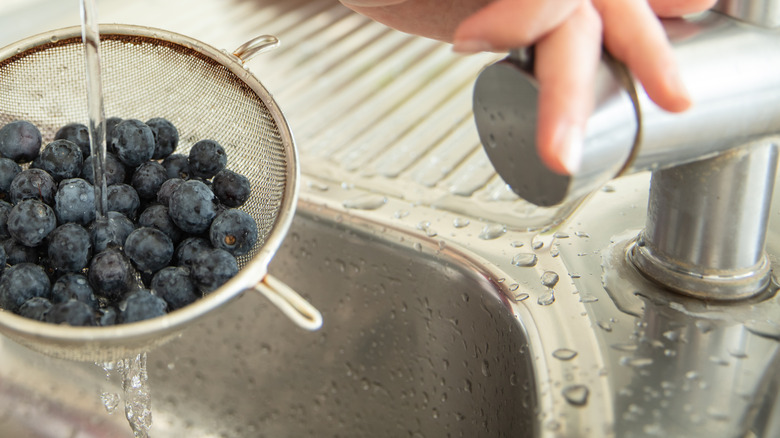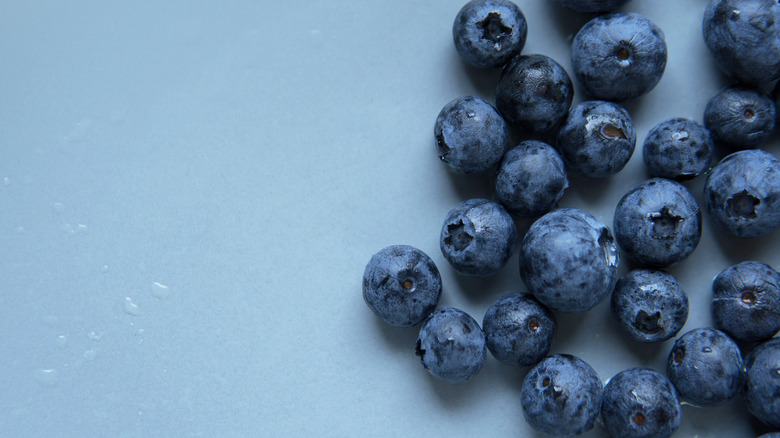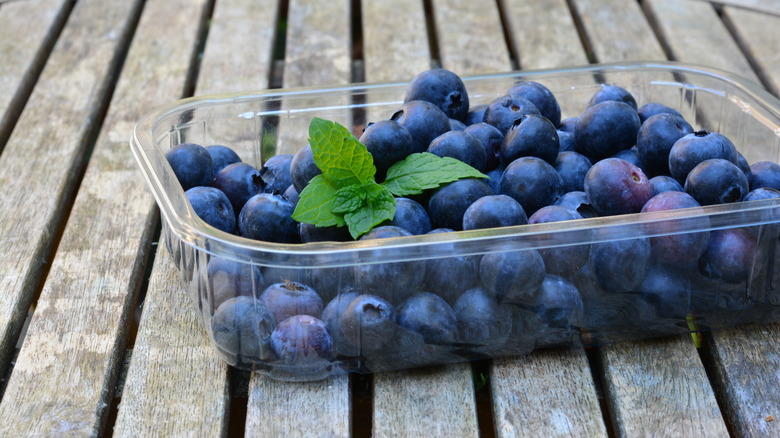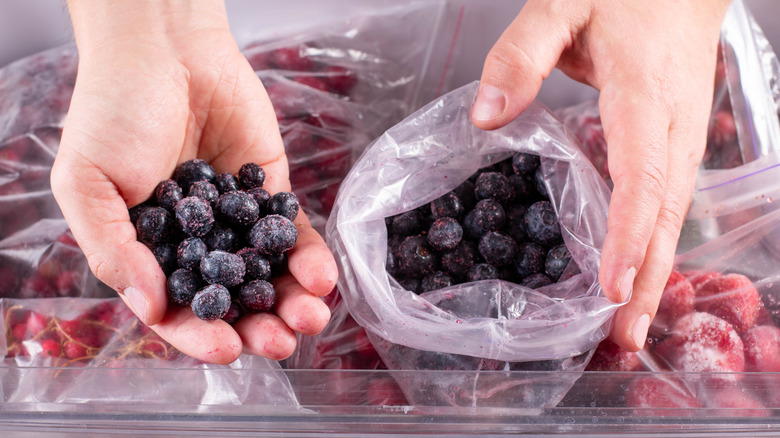How To Keep Blueberries Fresh
Most fruits, including blueberries, have a very limited shelf life. However, blueberries have a natural advantage that keeps them fresh longer. If you've ever observed the fruit closely, you probably noticed the grayish-white color that makes it look like they have been dipped in a thin layer of wax. Per The Kitchn, this waxy layer is called bloom and can be found in blueberries, grapes, plums, apples, and more. This natural coating is a protective barrier between the fruit, insects, and bacteria; it also keeps moisture locked in, making blueberries stay naturally fresh for longer. As blueberries age and lose their freshness, the natural bloom coating begins to weaken.
However, despite this natural protective layer, if blueberries are left on the counter, they only tend to stay fresh for two to three days (via Eat By Date). According to Healthline, blueberries are low in calories, a good source of vitamin C, vitamin K1, manganese, and antioxidants; they are often considered to be a superfood. Extending the shelf life of your blueberries should be at the top of your list. By using a few tricks, you'll have a fresh stash of this delicious fruit for much longer.
Inspect and dry
One trick to keep blueberries fresh starts right when you buy them. Since the white waxy coating — also known as the bloom — weakens as the fruit ages, choosing berries with a heavier wax coating is a great way of telling apart fresh blueberries from comparatively staler ones (via The Kitchn). Look for blueberries with a healthy bloom as a sign that they will last longer.
Once you've bought your plump, firm, and shiny blueberries, PureWow recommends picking off any blueberries that even look remotely moldy or mushy. One moldy blueberry is all it takes to spoil a fresh batch. Next, you want to do everything possible to make sure the blueberries remain as dry as possible if you plan to store them (via All Recipes). Pat the blueberries with a paper towel until they are fully dry so that no moisture seeps in. Simply picking off bad blueberries and drying them can go a long way in keeping this fruit fresh for longer.
Don't rinse them in advance
Rinsing blueberries is just as important because it can get rid of soil residuals, bacteria, insects, dirt, and traces of pesticides. Having said so, moisture and berries don't work well together. In fact, you should be drying your blueberries with a paper towel before storing them (via All Recipes). It goes without saying that blueberries rinsed with water are not going to stay fresh for very long.
To avoid your blueberries from becoming soft, squishy, and mushy, don't rinse them in advance. According to PureWow, this will keep them away from moisture. Wash the fruit only before you're ready to eat it and only wash what you can eat immediately. If you absolutely must wash them before storage for any reason, spread them on a tray and remove excess water with a paper towel and wait for them to dry completely. Whatever you do, you want to make sure that no moisture sneaks into your blueberries before storing them.
Vinegar bath
While rinsing your blueberries with water in advance can shorten their shelf life, giving them a vinegar bath can do wonders to help keep the fruit stay fresh for longer. According to Food52, berries are notorious for getting moldy because of tiny little mold spores that form a fuzzy layer the second there's any trace of moisture on the skin. A solution of vinegar and water is all you need to kill these nasty little spores.
Mix one cup of vinegar with three cups of water in a large bowl and then soak your blueberries in the solution before draining and rinsing them in freshwater. If you don't have vinegar, a 30-second warm water bath at a temperature of 120 to 140 Fahrenheit, should do an equally good job of helping berries stay fresh.
The golden rule is to make sure that the blueberries are fully dry before being stored. Another good way to dry wet blueberries quickly is to spin them in a salad spinner lined with three layers of paper towels for 15 seconds.
Refrigerate
The most obvious way to keep blueberries fresh is to store them in a refrigerator. After all, refrigerating blueberries can increase their shelf life from a mere two to three days to at least five days, sometimes even not 10 (via Eat By Date). It may seem as easy as grabbing a blueberry box from a supermarket and popping it straight into the refrigerator, but there are a few additional steps along the way that will help keep the blueberries fresh for even longer.
The cardinal rule for storing calls for the use of air-tight containers, but Bon Appétit shared that blueberries should be stored in anything but an airtight container. Store the berries in a container that allows the berries to breathe and line it with a paper towel that will soak up any moisture. Close the lid loosely so that any extra moisture can escape and pop the container in the center of the refrigerator where it isn't freezing. Whatever you do, don't store them in the crisper drawer — the drawer in which you usually store produce — as the air doesn't circulate as well and that does not help this superfood stay fresh, according to Epicurious.
Freeze
The rows and rows of berry bags in frozen sections of supermarkets are proof enough that berries are excellent for freezing. In fact, frozen blueberries can last for as long as six to eight months (via Eat By Date)! While you could just pop the entire container that the blueberries come in straight into the freezer, there is a better way to do this so that they don't clump into one big blueberry ball.
Once again, leave your blueberries unwashed and thoroughly dry. Then, The Kitchn suggests placing the berries in a single layer on a rimmed baking tray and popping the tray into the freezer. Once each blueberry has individually frozen, you can then transfer the berries together in a zip-top bag to the freezer. As a bonus, the waxy bloom coating on blueberries also works as a natural nonstick layer so your individually frozen blueberries will remain separate. When you're ready to use your blueberries, simply place as many berries as you need in room temperature water for about five minutes and let them thaw.





